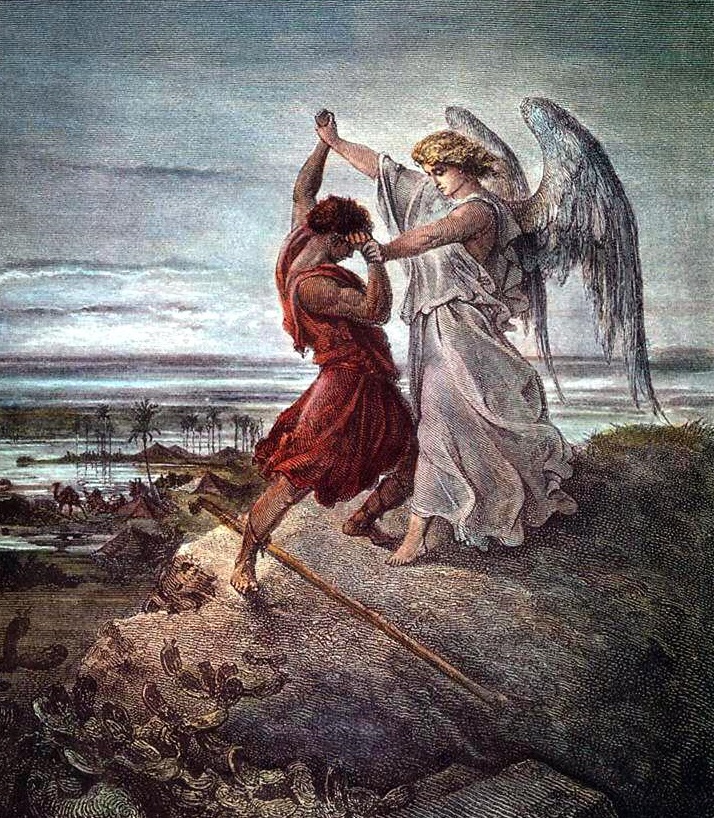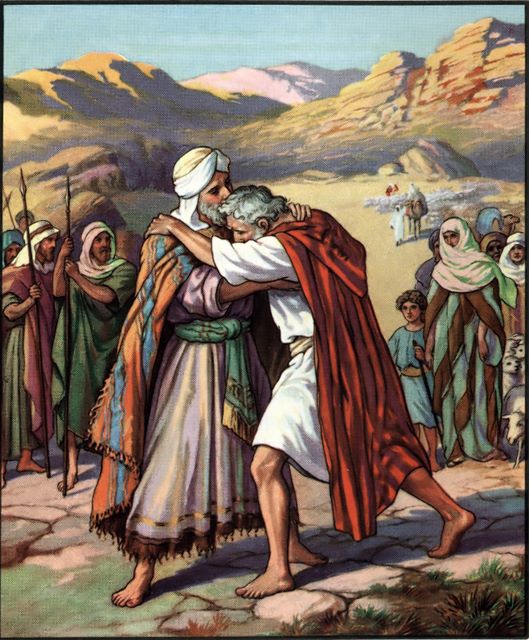A Midnight Wrestling MatchGenesis 30:25 to 33:20
JACOB stayed a long time in the land of Haran, much longer than he had expected to stay. And in that land Jacob became rich. As wages for his work with Laban, Jacob took a share of the sheep, and oxen, and camels. And since Jacob was very wise and careful in his work, his share grew larger, until Jacob owned a great flock and much cattle. At last, after twenty years, Jacob decided to go back to the land of Canaan, and to his father Isaac, who was still living, though now very old and feeble.
Jacob did not tell his uncle Laban that he was going away; but while Laban was absent from home, Jacob gathered together his wives, and children, and all his sheep and cattle, and camels, and he stole away quietly. When Laban found that Jacob had left him, he was not at all pleased; for he wished Jacob still to care for the things that he owned, for Jacob managed them better than Laban himself, and God blessed everything that Jacob undertook. Then, too, Laban did not like to have his two daughters, the wives of Jacob, taken so far away from him.
So Laban and the men who were with him followed after Jacob; but that night God spoke to Laban in a dream and said:
"Do no harm to Jacob, when you meet him."
Therefore, when Laban came to where Jacob was in his camp on Mount Gilead, on the east of the river Jordan, Laban spoke kindly to Jacob. And Jacob and Laban made a covenant, that is a promise between them. They piled up a heap of stones, and on it they set up a large rock like a pillar; and beside the heap of stones they ate a meal together; and Jacob said to Laban:
"I promise not to go past this heap of stones, and this pillar to do you any harm. The God of your grandfather, Nahor, and the God of my grandfather, Abraham, be the judge between us."
And Laban made the same promise to Jacob; and then he kissed his daughters, Jacob's two wives, and all of Jacob's children, and bade them good-by; and Laban went back to Haran, and Jacob went on to Canaan.
And Jacob gave two names to the heap of stones where they had made the covenant. One name was "Galeed," a word which means, "The heap of Witness." The other was "Mizpah," which means "Watch-tower." For Jacob said, "The Lord watch between you and me, when we are absent from each other."
While Jacob was going back to Canaan, he heard news that filled him with fear. He heard that Esau, his brother, was coming to meet him, leading an army of four hundred men. He knew how angry Esau had been long before, and how he had threatened to kill him. And Jacob feared that Esau would now come upon him, and kill, not only Jacob himself, but his wives and his children. If Jacob had acted rightly toward his brother, he need not have feared Esau's coming; but he knew how he had wronged Esau, and he was terribly afraid to meet him.
That night Jacob divided his company into two parts; so that if one part were taken the other part might escape. And he sent onward before him, as a present to his brother, a great drove of oxen and cows, and sheep and goats, and camels and asses; hoping that by the present his brother might be made more kind toward him. And then Jacob prayed earnestly to the Lord God to help him. After that he sent all his family across a brook that was in his path, called the brook Jabbok, while he stayed alone on the other side of the brook to pray again.
And while Jacob was alone, he felt that a man had taken hold of him, and Jacob wrestled with this strange man all the night. And the man was an angel from God. They wrestled so hard, that Jacob's thigh was strained in the struggle. And the angel said:
"Let me go, for the day is breaking."
And Jacob said:
"I will not let thee go until thou dost bless me." And the angel said:
"What is your name?"
And Jacob answered, "Jacob is my name."
Then the angel said:
"Your name shall no more be called Jacob, but Israel, that is 'He who wrestles with God.' For you have wrestled with God and have won the victory."
And the angel blessed him there. And the sun rose as the angel left him; and Jacob gave a name to that place. He called it Peniel, or Penuel, words which in the language that Jacob spoke mean "The Face of God." "For," said Jacob, "I have met God face to face." And after this Jacob was lame, for in the wrestle he had strained his thigh.
And as Jacob went across the brook Jabbok, early in the morning, he looked up, and there was Esau right before him. He bowed with his face to the ground, over and over again, as people do in those lands when they meet some one of higher rank than their own. But Esau ran to meet him, and placed his arms around his neck, and kissed him; and the two brothers wept together. Esau was kind and generous to forgive his brother all the wrong that he had done; and at first he would not receive Jacob's present, for he said: "I have enough, my brother." But Jacob urged him, until at last he took the present. And so the quarrel was ended, and the two brothers were at peace.
Jacob came to Shechem, in the middle of the land of Canaan, and there he set up his tents; and at the foot of the mountain, although there were streams of water all around, he dug his own well, great and deep; the well where Jesus sat and talked with a woman many ages after that time; and the well that may be still seen. Even now the traveler who visits that place may drink water from Jacob's well.
After this Jacob had a new name, Israel, which means, as we have seen, "The one who wrestles with God." Sometimes he was called Jacob, and sometimes Israel. And all those who come from Israel, his descendants, were called Israelites.
After this Isaac died, very old, and was buried by his sons Jacob and Esau, in the cave at Hebron where Abraham and Sarah were buried already. Esau with his children and his cattle went away to a land on the southeast of Canaan, which was called Edom. And Jacob, or Israel, and his family lived in the land of Canaan dwelling in tents, and moving from place to place, where they could find good pasture, or grass upon which to feed their flocks.


